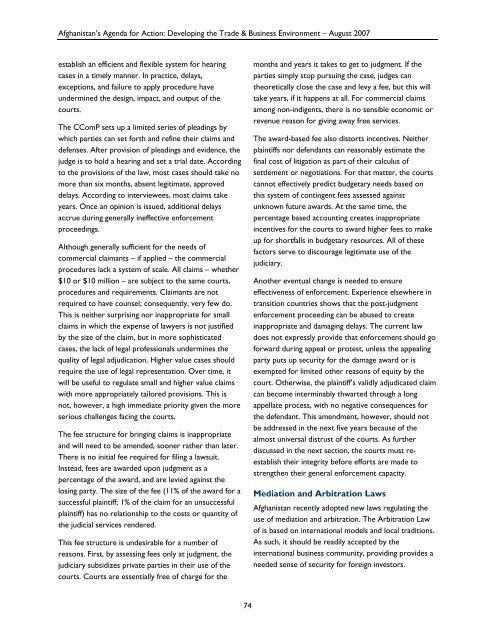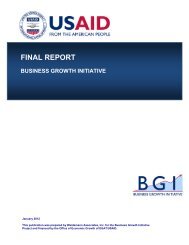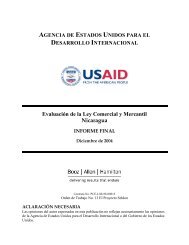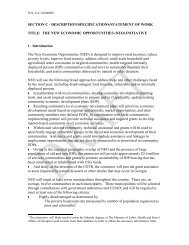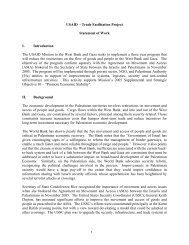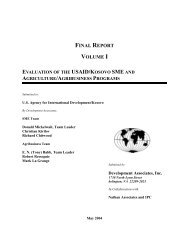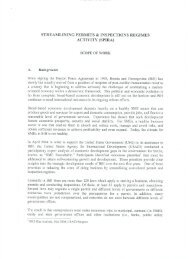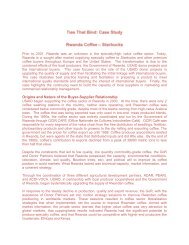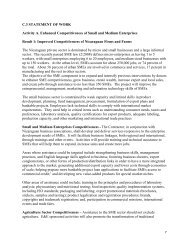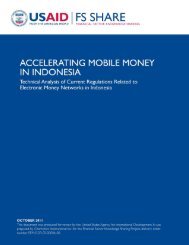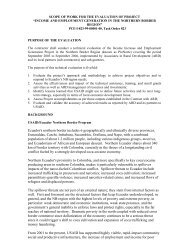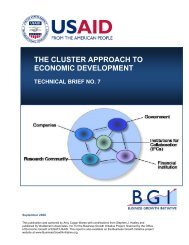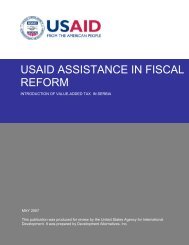Afghanistan's Agenda for Action - Economic Growth - usaid
Afghanistan's Agenda for Action - Economic Growth - usaid
Afghanistan's Agenda for Action - Economic Growth - usaid
You also want an ePaper? Increase the reach of your titles
YUMPU automatically turns print PDFs into web optimized ePapers that Google loves.
Afghanistan’s <strong>Agenda</strong> <strong>for</strong> <strong>Action</strong>: Developing the Trade & Business Environment – August 2007establish an efficient and flexible system <strong>for</strong> hearingcases in a timely manner. In practice, delays,exceptions, and failure to apply procedure haveundermined the design, impact, and output of thecourts.The CComP sets up a limited series of pleadings bywhich parties can set <strong>for</strong>th and refine their claims anddefenses. After provision of pleadings and evidence, thejudge is to hold a hearing and set a trial date. Accordingto the provisions of the law, most cases should take nomore than six months, absent legitimate, approveddelays. According to interviewees, most claims takeyears. Once an opinion is issued, additional delaysaccrue during generally ineffective en<strong>for</strong>cementproceedings.Although generally sufficient <strong>for</strong> the needs ofcommercial claimants – if applied – the commercialprocedures lack a system of scale. All claims – whether$10 or $10 million – are subject to the same courts,procedures and requirements. Claimants are notrequired to have counsel; consequently, very few do.This is neither surprising nor inappropriate <strong>for</strong> smallclaims in which the expense of lawyers is not justifiedby the size of the claim, but in more sophisticatedcases, the lack of legal professionals undermines thequality of legal adjudication. Higher value cases shouldrequire the use of legal representation. Over time, itwill be useful to regulate small and higher value claimswith more appropriately tailored provisions. This isnot, however, a high immediate priority given the moreserious challenges facing the courts.The fee structure <strong>for</strong> bringing claims is inappropriateand will need to be amended, sooner rather than later.There is no initial fee required <strong>for</strong> filing a lawsuit.Instead, fees are awarded upon judgment as apercentage of the award, and are levied against thelosing party. The size of the fee (11% of the award <strong>for</strong> asuccessful plaintiff; 1% of the claim <strong>for</strong> an unsuccessfulplaintiff) has no relationship to the costs or quantity ofthe judicial services rendered.This fee structure is undesirable <strong>for</strong> a number ofreasons. First, by assessing fees only at judgment, thejudiciary subsidizes private parties in their use of thecourts. Courts are essentially free of charge <strong>for</strong> themonths and years it takes to get to judgment. If theparties simply stop pursuing the case, judges cantheoretically close the case and levy a fee, but this willtake years, if it happens at all. For commercial claimsamong non-indigents, there is no sensible economic orrevenue reason <strong>for</strong> giving away free services.The award-based fee also distorts incentives. Neitherplaintiffs nor defendants can reasonably estimate thefinal cost of litigation as part of their calculus ofsettlement or negotiations. For that matter, the courtscannot effectively predict budgetary needs based onthis system of contingent fees assessed againstunknown future awards. At the same time, thepercentage based accounting creates inappropriateincentives <strong>for</strong> the courts to award higher fees to makeup <strong>for</strong> shortfalls in budgetary resources. All of thesefactors serve to discourage legitimate use of thejudiciary.Another eventual change is needed to ensureeffectiveness of en<strong>for</strong>cement. Experience elsewhere intransition countries shows that the post-judgmenten<strong>for</strong>cement proceeding can be abused to createinappropriate and damaging delays. The current lawdoes not expressly provide that en<strong>for</strong>cement should go<strong>for</strong>ward during appeal or protest, unless the appealingparty puts up security <strong>for</strong> the damage award or isexempted <strong>for</strong> limited other reasons of equity by thecourt. Otherwise, the plaintiff’s validly adjudicated claimcan become interminably thwarted through a longappellate process, with no negative consequences <strong>for</strong>the defendant. This amendment, however, should notbe addressed in the next five years because of thealmost universal distrust of the courts. As furtherdiscussed in the next section, the courts must reestablishtheir integrity be<strong>for</strong>e ef<strong>for</strong>ts are made tostrengthen their general en<strong>for</strong>cement capacity.Mediation and Arbitration LawsAfghanistan recently adopted new laws regulating theuse of mediation and arbitration. The Arbitration Lawof is based on international models and local traditions.As such, it should be readily accepted by theinternational business community, providing provides aneeded sense of security <strong>for</strong> <strong>for</strong>eign investors.74


